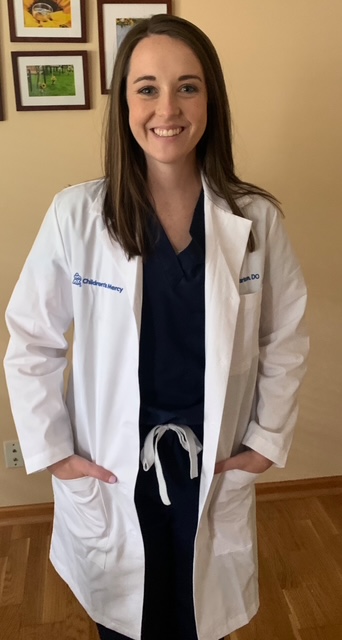Q: Why did you choose children’s mercy as your job?
I am currently a resident at Children’s Mercy, so I went through a process called the Match my final year of medical school. The match is a program that all medical students participate in to be placed in a residency you decide which specialty you want to go into and apply to residency programs within that specialty. After interviews, each medical students submits a rank list ranking all of the programs they interviewed at and the programs rank all of the students they interviewed. Then each applicant is matches at a program that ideally ranked them highly and that the student also ranked highly.
I decided to pursue a career in pediatrics because I find working with children and their families incredibly rewarding. You get to take care of not only the child but also the family and can make a positive impact early on the kid’s life. When I applied for residency I mostly applied to programs in the Midwest since I am from Kansas and my husband is from Iowa and we wanted to be close to family and friends. I went to med school in Kansas City and had spent some time rotating at CXhildren’sMercy as a medical student and was very impressed by their residents. They all seemed to enjoy their jobs and were also passionate, well-rounded physicians. I also liked the idea of being able to serve a community that was so close to my hometown, so I ranked Children’s Mercy highly and was lucky enough to match here.
Q: Was it hard to get into medical school?
Getting into medical school is hard, and I actually did not get accepted the first time I applied. I took a year off in-between college and medical school and worked in a microbiology lab. I re-applied that year and got accepted. You have to have taken certain classes (usually basic sciences and some math) and be involved in extracurricular activities like clubs, sports, and volunteer work.
Q: What is the biggest challenge about medical school?
The biggest challenge for me was adjusting to how quickly the courses move in medical school. Topics that were covered over 1-2 weeks in college were covered in a single lecture in medical school. You have to learn how to manage your time and find effective and efficient study methods in order to keep up with all of your coursework.
Q: What are your longer term goals in the profession?
I will finish my residency this summer and have applied for Pediatric Critical Care fellowship with the goal of becoming a pediatric intensives.
Q: Who are some teachers here that inspired you?
The two that come to mind are Ms. Marten and Mr. Harris (and I’m not just saying that because he is the journalism teacher!). Ms. Marten made learning Spanish fun and encouraged me to continue studying it in college. I have continued to use my Spanish as a doctor and just passed the exam required to become a bilingual physician. Mr. Harris was always supportive and helped me explore different interests and develop writing skills while I was on the newspaper staff. I have gotten compliments regarding the different personal statements and cover letters I have written while applying to medical school, residency and fellowship and I attribute this to my time on the journalism staff at BHS.
Q: What are your best memories from BHS?
I honestly can’t point to exact moments from my time at BHS that I would say are my favorite memories. When I reflect on my time as a student there what stands out the most is the experience I had as a whole. Going to a smaller school afforded me the opportunity to be involved in a wide variety of activities. I was involved in Student Council, journalism, and played volleyball all while still being able to take AP and college level courses. I felt like my classes and extracurricular activities set me up well for college and beyond, because they taught me how to manage my time and excel both in and out of the classroom.


